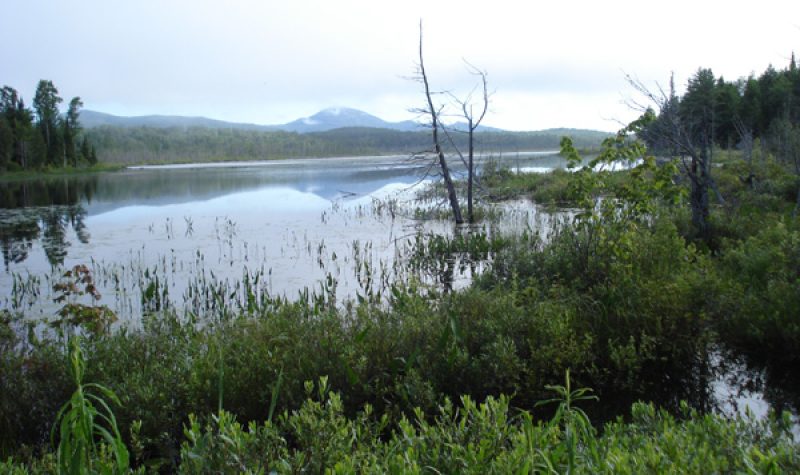Non-profit conservation organizations Appalachian Corridor and Conservation des vallons de la Serpentine (CVS) have succeeded in protecting 84 acres of the Millington Bog in perpetuity.
Located in the municipality of Austin, the Millington Bog is unique for being an uncommon wetland in the Eastern Townships. It is home to various species of plants that are rare in Southern Quebec. The Millington Bog is also key to the preservation of the water quality of Lac Memphremagog due to its water filtration capabilities, according to Mélanie Lelièvre, executive director of Appalachian Corridor.
Appalachian Corridor and CVS started to work on protecting the Millington Bog around 2009. Their most recent feat adds to the more than 235 acres that both groups succeeded in protecting back in 2012, funded in part by the Quebec government’s Program Partenaires pour la nature.
Appalachian Corridor, in collaboration with other conservation organizations and partners, works with landowners to protect natural areas rich in biodiversity in the Appalachian region of Southern Quebec. CVS protects areas that are rich in natural environments and species. Like Appalachian Corridor, it works with private landowners to make this happen. Lands owned by CVS are eventually designated as "nature reserves" by the Quebec Ministry of the Environment and Climate Change.
Moving forward, the partners will continue working together to protect more of the Millington Bog.
“Previous to the project that we are announcing, we had two previous conservation transactions for this bog, for this wetland, so now it’s another 84 acres that we are announcing. We are not making this announcement alone. The owner of this land is CVS, it’s our local affiliated member. We’ve done all the projects, the negotiations, and they accepted to become the landowners. So they are now the guardians of this property,” announced Lelièvre.
Lelièvre explained that they began working with the owners of this piece of land back in 2015.
“They were interested, but they were not ready at that time. So we kept contact. Every year we made a phone call to ask if anything had changed, if their decision was made up. A year and a half ago they called us back and they said ‘okay, we are ready, we are considering selling our land and we prefer that it’s a conservation organization that owns the property and takes care of it.’ (…) Legally, it’s now protected forever,” she said. “It’s an official protected area recognized under Quebec and Federal authorities.”
Lelièvre added that they received financial support from both the provincial and federal government to make the project happen.
“We have funding support from the Ministry of Environment of Quebec as well as the Ministry of Environment of Canada through a program called the NHCP (Natural Heritage Conservation Program). We had support from the municipality of Austin and private donations that were gathered a couple years ago during our major campaign as well,” she mentioned.
Lelièvre noted that it was important for people to recognize that bogs are rare to find here in the region.
“Bogs, even though they might be common in different parts of Quebec, like in Centre du Quebec or in Abitibi, here in the region there are very few bogs. These types of wetlands are very important. Here, they are rare, and this specific one is very large. It’s one of the largest bogs that we have on the territory and it occupies 652 acres, only the bog,” said emphasized.
She describes the Millington Bogs’ water as “acidic,” allowing rare plant species to thrive.
“It’s a very specific type of habitat. It inhabits rare plants and plants that live in acidic soil, like carnivorous plants and an orchid that is quite rare called the dragon’s mouth. This plant is the municipal floral emblem. So we are happy that the municipality has supported this project and this tiny little flower is there; it’s a wonderful orchid,” said Lelièvre.
The Millington Bog, located in the Lake Memphremagog watershed, also has a “rich biodiversity,” according to Lelièvre.
“Plus, it plays a very important role for the water quality of Lake Memphremagog. (…) The bog acts like a gigantic sponge. It absorbs large amounts of water during high precipitation or flooding periods and it gradually releases the water during periods of drought,” she explained. “So it’s so important for the regulation of water. As well, it filters runoff water, the sediments, and the pollutants that come in the bog, in the wetland, and in the little streams. After it passes through the bog, the water is really filtered, it has been regulated, and cleaned. (…) This is why it’s so important at the municipal level.”
When asked if Appalachian Corridor planned on partnering up with CVS to protect more of the Millington Bog in the future, Lelièvre said “absolutely.”
“We’re still discussing with other landowners. We’re still trying to negotiate other projects in the wetland complex, in the Millington Bog. We have a project that’s going very well, it might be protected in the coming year, and we keep in contact with others. (…) We know that we will have more opportunities overtime and we are patient,” she highlighted.
For more information on Appalachian Corridor, visit the website.
For more information on CVS, visit the website.
Listen to the full interview below:


